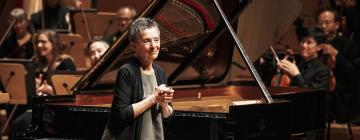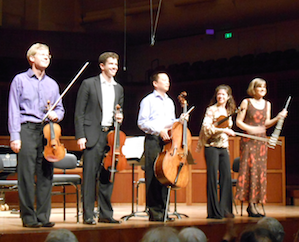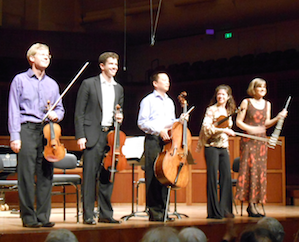
Photos by Janos Gereben
Flautist Catherine Payne welcomed the surprisingly large audience in Davies Symphony Hall Sunday afternoon by saying that it's good to be back. She got a big applause without spelling out the reason for the absence, the musicians' 18-day-long strike, which ended with the announcement of a tentative agreement on Easter Sunday. There were some whispered questions in the audience about when ratification is expected, but attention turned to the music.
The Chamber Music Series rarely has a house as full as it was on this occasion, and the visible reason was attendance by several school groups — high time somebody added up the advantages of more listeners and the possible capture of young audiences as future music lovers.
Payne joined violinists Melissa Kleinbart and Dan Carlson, violist Matthew Young (replacing Yun Jie Liu, still listed in the program), and cellist Amos Yang, in a spirited performance of Mrs. H.H.A. Beach's 1916 Theme and Variations for Flute and String Quartet, Op.80. Payne explained that the country's first famous woman composer, better known as Amy Beach, used her husband's name until his death. Added information: "the prominent Boston physician ended her career as a pianist, but — lucky for us! — encouraged her work to compose."
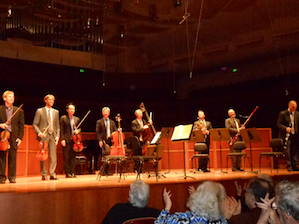
Payne's soaring, rich flute was embraced and lifted by Kleinbart's dark, soulful violin; Carlson's straightforward sound; short, lyrical solos from Yang's cello. The opening theme, presented gorgeously by the quartet, and then embellished by Payne, was followed by six eventful variations with fluctuations in dynamics and tempos, some with boldly playful and robust sound, others more lyrical and pensive. The biggest work — in numbers, volume, and impact — closed the program. It was Hindemith's 1957 Octet for clarinet (David Neuman), bassoon (Steven Dibner), horn (Bruce Roberts), violin (Carlson), 2 violas (Jonathan Vinocour and David Kim), cello (Peter Wyrick), and bass (S. Mark Wright).
The eight — including notable SFS principal players — had a ball with the intense, contrapuntal work, which ranges from waltzes and galops to frantic romps, all with the assured mastery of the mature artist at the height of his career. It has been suggested that the viola — pitched against the other instruments, including the obviously more powerful horn and woodwinds — represents the composer, and Vinocour made the most of that challenge.
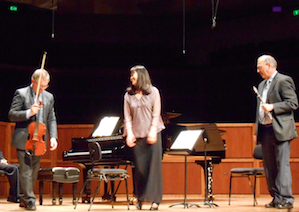
Although the Chamber Music Series is programmed, run, and performed by SFS musicians, there are occasional exceptions, and a fortuitous one today was the appearance of pianist June Choi Oh, of the S.F. Conservatory of Music faculty, in five selections from Max Bruch's 1908 Eight Pieces for Clarinet, Viola, and Piano, Op. 83.
Oh, partnering beautifully David Neuman's clarinet of exceptional clarity and Wayne Roden's lyrically singing viola, managed to combine the seemingly contradictory tasks of leading some of the musical lines while remaining understated at the same time. She is both a star and a faithful servant of the composer. The performance was memorable in fusing three individual (and different) voices into one beautiful sound.
Time constraints must have caused the awkward dropping of the fourth, sixth, and eighth piece, and at one point, there was a bit of confusion from a combination of not everybody picking up the next piece on the program after an omitted one, and Neuman's problem with his instrument. The performance went on, and the hiccup was soon forgotten.
Program notes spoke of Bruch's "Schumannesque" sound and the similarity to Schumann's Fairy Tales, also scored to clarinet, viola, and piano, but I think too much was made of the kinship. Bruch, not an avid chamber music composer (except for his enthusiasm in writing a lengthy Septet at age 11), is very much his own romantic self.
Unlike other programs of this series, this was a mostly classical concert, "fairly contemporary" music represented, besides the Hindemith, by Josif Andriasov's 1957 Trio in C Minor for violin, cello, and piano. Performed by Victor Romasevich, Jill Rachuy Brindel, and Marilyn Thompson, the Trio is surprisingly brief and it doesn't measure up to the excellence of Andriasov's symphonic works.
Violin and piano pushed the first movement's passion into something approaching noisy, the cello anchoring them to terra firma. The Andante that follows is so brief and understated, it appears virtually unnecessary. The concluding Allegro con brio bounces impressively, redeeming the work.
Look out for more to come in the Chamber Music Series.
